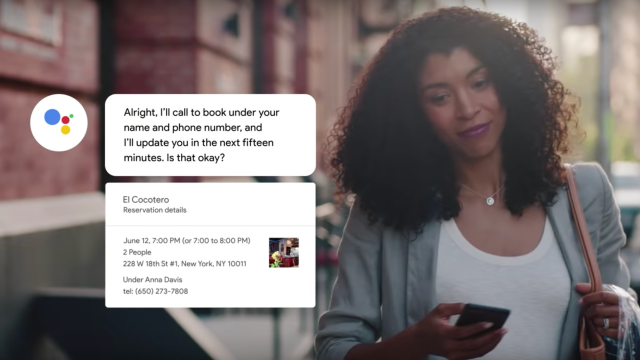Last year, when Google first showed off its new Duplex feature that used artificial intelligence to make calls for users, it terrified us because it sounded so human.
During the demonstration, Google CEO Sundar Pichai presented Duplex as being an entirely automated service. Google Duplex’s AI assistant called a hair stylist to schedule an appointment and called a restaurant requesting information. The automated voices behind the calls were remarkably life-like with their inflections and “mm-hmm”s and “umm”s.
The calls were so humanistic, it seemed nearly impossible for a casual listener on the other end of the call to determine whether it’s a human or AI.
A year after Duplex’s launch, it’s even more difficult to make that distinction—because Duplex calls could actually be from either a human or AI.
Google confirmed to the New York Times that about 25 per cent of calls made by Duplex begin with a human, and about 15 per cent of calls that begin with AI have human intervention at some point during the call. That would suggest that just over 60 per cent of calls made by Duplex are completely automated.
However, the Times performed its own test, using Duplex to call more than a dozen restaurants, and Times found that three out of the four successful Duplex bookings were made by humans. (Some restaurants rejected other requests because the party size was too small, not because of some fault with the AI.)
Google did not immediately respond to a Gizmodo request for comment on the percentage of Duplex calls that have human involvement.
Nick Fox, vice president of Google Assistant product and design, told the Times Google was not rushing to eradicate human involvement with Duplex because the company didn’t want to cause headaches for the businesses that have to take the calls. Fox explained Google wants to progressively improve the feature and decrease human involvement over time.
As the Times points out, building a system that is entirely automated requires a lot of data to enable the neural networks to be ready for any difficult or nuanced questions during calls.
Google is likely using human callers to create more of that data to train Duplex.
So what was originally promoted as an entirely automated system is actually a cyborg-like blend of AI and humans. But in time, humans won’t have to take the wheel, we will be able to have true robot assistants, and some call centre employees may be out of a job.
